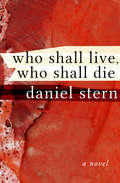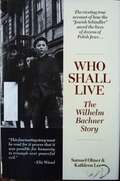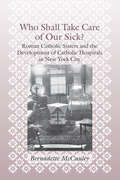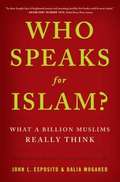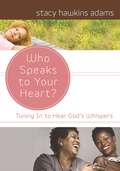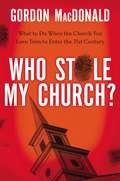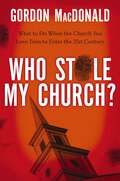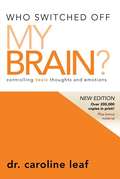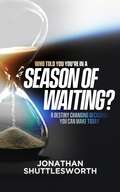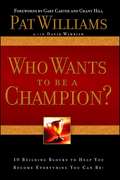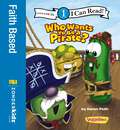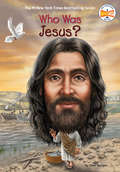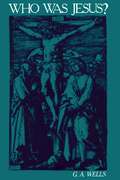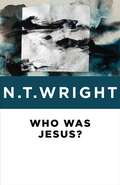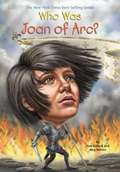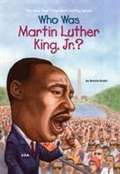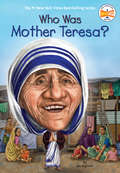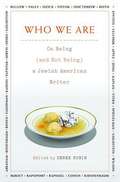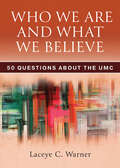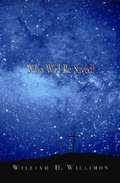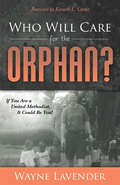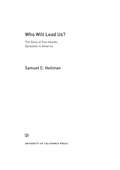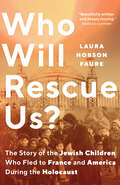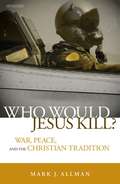- Table View
- List View
Who Shall Live, Who Shall Die: A Novel (First Rediscovered Modern Masterpieces Edition Ser.)
by Daniel SternWinner of the International Prix du Souvenir Award: A theater director and Holocaust survivor is confronted by a figure from his pastBehind the lights and glamour of Broadway, two men reckon with a shared past—one that hides a terrible secret. Jud Kramer is mounting his most painful and personal play while trying to enjoy life with his beautiful actress wife and baby daughter. Into his life comes Carl Walkowitz, a brooding, charismatic drifter who bears the scars of his concentration camp past.One man lives in the past, and the other is holding tight to the present. Carl methodically pursues Jud until they find themselves on an empty stage, face to face in a struggle that only one of them can survive.
Who Shall Live: Wilhelm Bachner Story
by Samuel Oliner and Kathleen LeeThis incredible book has been called "a stirring chapter to documented Jewish resistance to the Holocaust." Wilhelm Bachner has been called "the Jewish Schindler" because of his heroics in saving hundreds of Jewish families from almost certain annihilation in the Warsaw Ghetto in 1939. The authors interviewed Bachner in 1983, and did extensive historical research.
Who Shall Take Care of Our Sick?: Roman Catholic Sisters and the Development of Catholic Hospitals in New York City (Medicine, Science, and Religion in Historical Context)
by Bernadette McCauleyThis rich history chronicles the prominent role of Catholic women religious in establishing the hospitals at the core of New York City's extensive Catholic medical network. Beginning with the opening of St. Vincent's Hospital in 1849, Bernadette McCauley relates how determined and pragmatic women of faith worked over the next eighty years to place the Catholic Church in the mainstream of American medicine.Exploring the differences and similarities between Catholic hospitals and other hospitals, McCauley describes the particular cultural sensibility and management style that informed Catholic health care and gauges the ultimate success of Catholic efforts. Visionary sisters established, managed, and staffed the hospitals, and they sat on hospital boards and served as administrators at a time when women rarely occupied positions of leadership in business. McCauley illustrates how they at once embraced the world of God and the world of man, playing an unheralded role in the development of the modern hospital while serving the daily needs of New York's immigrant poor.Encompassing such issues as immigration, the education of nurses and doctors, hospital care and organization, and the role of women in the Catholic church, this extensive study is a valuable resource for scholars and students in the history of medicine, history of nursing, American religion, and women's history.
Who Speaks For Islam? What A Billion Muslims Really Think
by John L. Esposito Dalia MogahedThe religion of Islam and the mainstream Muslim majority have been conflated with the beliefs and actions of an extremist minority. The result was reflected in a USA Today/Gallup Poll which found substantial minorities of Americans admitting to negative feelings or prejudice against Muslims. The vital missing piece among the many voices weighing in on this question is the actual views of Muslim publics. Who Speaks for Islam? is about this silenced majority. It is the product of a mammoth research study undertaken over six years by the Gallup Organization. Gallup conducted tens of thousands of hour-long face to face interviews with residents of more than 35 predominantly Muslim nations. In totality we surveyed a sample representing over 90% of the world's 1. 3 billion Muslims, making this the largest, most comprehensive study of contemporary Muslims ever done.
Who Speaks to Your Heart?: Tuning in to Hear God's Whispers
by Stacy Hawkins Adams“I wrestled with whether a God that I couldn’t see or touch would be willing to single me out from the millions of other people who wanted love, attention and help.” To women all over the country, from all walks of life, this uncomfortable uncertainty is all too familiar. Now—for inspiration, for affirmation, for a divine connection—you have a new place to turn … to this authentic look at what it takes to pursue God with abandon, by acclaimed author Stacy Hawkins Adams. Offering insight, inspiration, and practical ideas on how to connect more often and more deeply with God, Adams helps give you and women the world over the courage to go deeper and grow deeper in God’s word to hear Him more clearly. Women young and old will be empowered and renewed by Adams’ reminder that—regardless of the labels placed on you by society, your family, your friends, and even yourself—your best and most important title is the one given by God … chosen vessel.
Who Stole My Church: What to Do When the Church You Love Tries to Enter the 21st Century
by Gordon MacdonaldHas your church been hijacked? Millions of people in their fifties, sixties, and seventies feel their churches have been hijacked by church-growth movements characterized by loud praise bands, constant PowerPoint presentations, and cavernous megachurches devoid of any personal touch. They are bewildered by the changes, and are dropping out after thirty, forty, or fifty years in a congregation. It's a crisis! In this fictional story, pastor and author Gordon MacDonald uses topical examples and all-too-familiar characters to reassure readers that it is possible to embrace change, and to demonstrate how that change can actually be a positive influence in their church. The church, he says, has always been in a state of change; it has been changing for the last two thousand years. It is time to embrace that change and use it further the Kingdom of God.
Who Stole My Church?: What to Do When the Church You Love Tries to Enter the 21st Century
by Gordon MacdonaldHas your Church been Hijacked? Millions of people in their fifties, sixties, and seventies feel their churches have been hijacked by church-growth movements characterized by loud praise bands, constant PowerPoint presentations, and cavernous megachurches devoid of any personal touch. They are bewildered by the changes, and are dropping out after thirty, forty, or fifty years in a congregation. It's a crisis! In this fictional story, pastor and author Gordon MacDonald uses topical examples and all-too-familiar characters to reassure readers that it is possible to embrace change, and to demonstrate how that change can actually be a positive influence in their church. The church, he says, has always been in a state of change; it has been changing for the last two thousand years. It is time to embrace that change and use it further the Kingdom of God
Who Switched Off My Brain? Controlling Toxic Thoughts and Emotions (Revised Edition)
by Caroline LeafDo you ever feel like your brain has just been "switched off"? Have you ever felt discouraged, unfocused or overwhelmed? Are there unhealthy patterns in your life or your family that you just can't seem to break? A thought may seem harmless, but if it becomes toxic, it can become physically, emotionally or spiritually dangerous. Thankfully, we are living in a time of revolution. We can see clearly how brain science lines up with Scripture--your mind can be renewed, toxic thoughts and emotions can be swept away and your brain really can be "switched on." In this book: * Learn how toxic thoughts are like poison and how to identify "The Dirty Dozen," twelve areas of toxic thinking in our lives. * Sweep away "The Dirty Dozen" by breaking the cycle of toxic thinking. Uncover how your thoughts can actually start to improve every area of your life--your relationships, your health and even your success.
Who Told You That You Were Naked?
by Victor SchlatterVictor Schlatter brings fresh biblical insight on the history of the Church and Israel. He starts with Adam and ends with the Anti-Christ. Be prepared to have your views challenged.
Who Told You You're in a Season of Waiting?: 6 Destiny Changing Decisions You Can Make Today
by Jonathan ShuttlesworthMake Bold Decisions and Pursue God’s Promises with Confidence.Are you waiting for a breakthrough that never seems to come? Have you been patiently enduring what seems like a “season of waiting” in your life? Evangelist and Pastor Jonathan Shuttlesworth will encourage you to turn your plans into action. Using scripture from God’s Word, Pastor Jonathan outlines a roadmap of principles, decisions, and actions that will lead you to your destiny. You’ll discover scriptures and biblical examples of specific actions God’s people took that empowered them to do exploits. God ordered the steps of His people in the Old and New Testaments, and He’s still giving directions today.This book will motivate you to get out of your own way, leave whatever is holding you back, and pursue all that God has for you. God will empower you to see the vision through to fruition when you decide to take the necessary actions and move according to the will of God.You Will Be Equipped To:• Live victoriously by overcoming the spirit of fear and defeat.• Develop a determination to bear fruit.• Look beyond your situation and act with an expectation to see God’s plan fulfilled.• Focus on new heights and your God-given future.• Run with the word God has given you over your life.• Turn your dreams into reality.• Make life-changing, action-oriented decisions.A Message from the Author: In this book, I confront the most paralyzing belief in the Christian faith—that we're destined to wait passively for God's timing. I show you through scripture and real-life examples that God calls us to be active participants in our faith, to make bold decisions, and to pursue His promises with confidence. Your actions can turn the tide and bring about the results you've been waiting for.About the Author: Jonathan Shuttlesworth is an evangelist and founder of Revival Today, a global ministry dedicated to reaching lost and hurting people with the Gospel of Jesus Christ. He is also the pastor of Revival Today Church, a Holy Spirit-filled, Bible-believing church that blesses families and the nation.
Who Wants to be a Champion?
by Pat Williams David WimbishMany people are so preoccupied with the stumbling blocks in their path that they have little time for the building blocks necessary to construct an exemplary life. Pat Williams believes it's time to clear the road and get on with the business of living a more fulfilling life. The culmination of twenty-five years of research and a lifetime of experience, this book challenges readers to get off the bench and throw themselves into living to their greatest potential. Williams is cofounder of the Orlando Magic, host of a radio show, father of nineteen children including fourteen he and his wife adopted, and an avid collector of stories and quotes. Williams delivers a rallying cry to anyone ready to become the champion God intended.
Who Wants to Be a Pirate?: Level 1 (I Can Read! / Big Idea Books / VeggieTales)
by Karen PothA Lesson about Self EsteemThe Pirates Who Don&’t Do Anything want to try something new. Will Larry, Lunt, and Pa Grape be happy when they try to be someone they&’re not?This is a Level One I Can Read! book, which means it&’s perfect for children learning to sound out words and sentences. It aligns with guided reading level I and will be of interest to children Pre-K to 2nd grade.
Who Was Jesus? (Who was?)
by Stephen Marchesi Nancy Harrison Ellen MorganThis fascinating addition to the best-selling Who Was. . . ' series does not settle questions of theology. Instead, it presents young readers with a biography that covers what is known historically about Jesus and places in his life in the context of his world when Jerusalem was part of the Roman Empire. In an even-handed and easy-to-read narrative, this title—illustrated with eighty black-and-white drawings—also explains the early origins of Christianity and how it became a major religion.
Who was Jesus?
by George Albert WellsWhat do we know about the historical origins of Christianity? How reliable are the 27 books of the New testament? Is Jesus a historical or a legendary figure?In the last 150 years, scholars have established many facts about the New testament, facts still largely unknown to the general public or to most church members. They have shown that the letters of Paul are earlier than the gospels and that many of the gospel stories about Jesus were unknown to Paul, that the earliest New Testament gospel is Mark and that the other gospels draw upon Mark and a now-lost gospel scholars call "Q", that none of the gospels is the work of an eye-witness, and that all the gospel writers were out of touch with events in Palestine.In Who Was Jesus?, G.A. Wells presents a survey of critical scholarly findings on the New Testament, in each case explaining the reasons for the scholars' conclusions, and describing those issues where scholars still disagree. By lucidly recounting the principles on which New testament criticism is based, this book enables readers to make up their own minds, while gently pointing to Wells' radical conclusion that the totality of the evidence supports the hypothesis of an entirely legendary Jesus. In the author's opinion, the analyses of most critics have been inhibited by their theological preconceptions, so that they have failed to draw the disturbing conclusions warranted by their findings.
Who Was Jesus?: Rediscovering Who Jesus Was And Is (The\ivp Signature Collection)
by N. T. WrightDid the historical person Jesus really regard himself as the Son of God? What did Jesus actually stand for? And what are we to make of the early Christian conviction that Jesus physically rose from the dead?In this book N. T. Wright considers these and many other questions raised by three controversial books about Jesus: Barbara Thiering's Jesus the Man, A. N. Wilson's Jesus: A Life, and John Shelby Spong's Born of a Woman. While Wright agrees with those authors that the real, historical Jesus has many surprises in store for institutional Christianity, he also presents solid reasons for discounting their arguments, claiming that they "fail to reach anything like the right answer" as to who Jesus really was.Written from the standpoint of professional biblical scholarship yet assuming no prior knowledge of the subject, Wright's Who Was Jesus? shows convincingly that much can be gained from a rigorous historical assessment of what the Gospels say about Jesus. This is a book to engage skeptics and believers alike.
Who Was Joan of Arc? (Who was?)
by Andrew Thomson Pam Pollack Nancy Harrison Meg BelvisoJoan of Arc was born in a small French village during the worst period of the Hundred Years' War. For generations, France had been besieged by the British. At age 11, Joan began to see religious visions telling her to join forces with the King of France. By the time she was a teenager, she was leading troops into battle in the name of her country. Though she was captured and executed for her beliefs, Joan of Arc became a Catholic saint and has since captured the world's imagination.
Who Was Martin Luther King, Jr.? (Who was?)
by Bonnie BaderDr. Martin Luther King, Jr. was only 25 when he helped organize the Montgomery Bus Boycott and was soon organizing black people across the country in support of the right to vote, desegregation, and other basic civil rights. Maintaining nonviolent and peaceful tactics even when his life was threatened, King was also an advocate for the poor and spoke out against racial and economic injustice until his death from an assassin's bullet in 1968. With clearly written text that explains this tumultuous time in history and 80 black-and-white illustrations, this Who Was book celebrates the vision and the legacy of a remarkable man.
Who Was Mother Teresa? (Who was?)
by Nancy Harrison Jim GigliottiBorn a humble girl in what is now Albania, Agnes Bojaxhiu lived a charitable life. She pledged herself to a religious order at the age of 18 and chose the name Sister Teresa, after the patron saint of missionaries. While teaching in India, where famine and violence had devastated the poor, Teresa shed her habit and walked the streets of Calcutta tending to the needs of the destitute. Her charity work soon expanded internationally, and her name remains synonymous with compassion and devotion to the poor.
Who We Are: On Being (and Not Being) A Jewish American Writer
by Derek RubinThis unprecedented collection brings together the major Jewish American writers of the past fifty years as they examine issues of identity and how they've made their work respond. E. L. Doctorow questions the very notion of the Jewish American writer, insisting that all great writing is secular and universal. Allegra Goodman embraces the categorization, arguing that it immediately binds her to her readers. Dara Horn, among the youngest of these writers, describes the tendency of Jewish writers to focus on anti-Semitism and advocates a more creative and positive way of telling the Jewish story. Thane Rosenbaum explains that as a child of Holocaust survivors, he was driven to write in an attempt to reimagine the tragic endings in Jewish history. Here are the stories of how these writers became who they are: Saul Bellow on his adolescence in Chicago, Grace Paley on her early love of Romantic poetry, Chaim Potok on being transformed by the work of Evelyn Waugh. Here, too, are Philip Roth, Cynthia Ozick, Erica Jong, Jonathon Rosen, Tova Mirvis, Pearl Abraham, Alan Lelchuk, Rebecca Goldstein, Nessa Rapoport, and many more. Spanning three generations of Jewish writing in America, these essays -- by turns nostalgic, comic, moving, and deeply provocative- constitute an invaluable investigation into the thinking and the work of some of America's most important writers.
Who We Are and What We Believe: 50 Questions about the UMC
by Laceye C. WarnerClear answers to common questions.This small, simple, and shareable book about The United Methodist Church is a helpful reference guide to everything that makes The UMC distinctive. Written in a clear, accessible style by Laceye Warner, Who We Are and What We Believe: 50 Questions about the UMC contains answers to fifty common questions about who United Methodists are, what we believe and practice, and what sets us apart. Use it alone or as a companion to Knowing Who We Are: The Wesleyan Way of Grace.
Who Will Be Saved?
by William H. WillimonWhat does it mean to say that salvation is God's business, and God's alone? "Who will be saved?" is almost always a question about them, and rarely about us. Thinking itself wrapped securely in the everlasting arms, the church has spent much of its history speculating on whether God will allow anyone else to join the party. But if we truly believe that salvation is God's business, and God's alone, then perhaps we should stop asking, "Who will be saved?" and ask instead, "How is God calling me to participate in the redemption of the world?" Rejecting the idea that God chooses some and not others, drawing on his Wesleyan heritage, and deepening his longstanding theological conversation with Karl Barth, Willimon reflects as a pastor and a theologian on God's intention that all would someday return from the far country into the loving embrace of the One who created them.
Who Will Care for the Orphan?: If You Are A United Methodist, It Could Be You! (Morgan James Faith)
by Wayne LavenderThis book is an important contribution for all United Methodists concerned that their denomination is approaching irrelevance. Within its pages Dr. Lavender offers a Biblical, Wesleyan and means-tested approach that both saves the lives of millions of orphans and vulnerable children and inspires evangelical hope for the church.
Who Will Lead Us?: The Story of Five Hasidic Dynasties in America
by Samuel C. HeilmanHasidism, a movement many believed had passed its golden age, has had an extraordinary revival since it was nearly decimated in the Holocaust and repressed in the Soviet Union. Hasidic communities, now settled primarily in North America and Israel, have reversed the losses they suffered and are growing exponentially. With powerful attachments to the past, mysticism, community, tradition, and charismatic leadership, Hasidism seems the opposite of contemporary Western culture, yet it has thrived in the democratic countries and culture of the West. How? Who Will Lead Us? finds the answers to this question in the fascinating story of five contemporary Hasidic dynasties and their handling of the delicate issue of leadership and succession. Revolving around the central figure of the rebbe, the book explores two dynasties with too few successors, two with too many successors, and one that believes their last rebbe continues to lead them even after his death. Samuel C. Heilman, recognized as a foremost expert on modern Jewish Orthodoxy, here provides outsiders with the essential guide to continuity in the Hasidic world.
Who Will Rescue Us?: The Story of the Jewish Children who Fled to France and America During the Holocaust
by Laura Hobson FaureThe first account of Jewish children’s flight from Nazi Germany to France—and their subsequent escape to America from the Vichy regime At the eve of the Second World War, an estimated 1.6 million Jewish children lived in Nazi-occupied Europe. While 10,000 of them escaped to Britain in the Kindertransport, only some 500 found a new home in France. Here they attempted to begin again—but their refuge would all too soon become a trap. For the first time, Laura Hobson Faure brings to life the experiences of these children, and the Jewish and non-Jewish organizations who helped them. Drawing on survivors’ testimonies as well as children’s diaries, letters, drawings, songs, and poems, Who Will Rescue Us? re-creates their complex journeys, including how some of them eventually found safety in America. Hobson Faure paints a moving portrait of these children and their escape, uncovering their agency in the flight from Nazism—and knits together the network of the many who aided them along the way.
Who Would Jesus Kill?: War, Peace, And The Christian Tradition
by Mark J. AllmanA concise, provocative look at the continuum of approaches to war and peace within the Christian tradition and beyond: pacifism, holy war and just war. In Who Would Jesus Kill? War, Peace, and the Christian Tradition, Dr. Mark J. Allman asks a provocative, timely, and timeless question. Readable and thought-provoking, Who Would Jesus Kill? Provides an overview of approaches to war and peace within the Christian tradition. The author invites students to reflect on their own views as he examines in detail the topics of holy war, just war, and pacifism. An appendix further explores the issues of war and peace from Jewish and Muslim perspectives.
